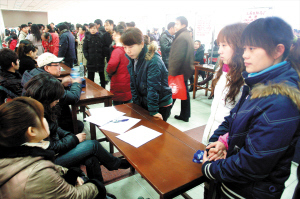Rural population to halve in 30 years: economist
|
|
China's rural population will shrink from the current 900 million to 400 million in 30 years, a top Chinese rural economist estimated.
Han Jun, director of the Research Department of Rural Economy with the State Council's Development Research Center, a top think tank, said Wednesday farmers will increasingly move to cities.
"This figure is drawn from our recent studies, based on the current rate of urbanization, as well as the hosting capacity of cities," he said.
As the world's most populous country, China boasts a population of 1.3 billion. The United Nations estimated in 2003 China's population will peak in 2030 at 1.45 billion.
On the recent labor shortages in China's coastal export hubs, Han said the phenomenon doesn't mean farmers are no longer seeking jobs in the cities.
"According to our research, the majority of migrant workers who left big cities are engaged in non-farming businesses in small towns adjacent to their homes," he said.
A major cause for their going home, especially for the less skilled workers, is the geographical shift of industry from the coast to inland areas, Han said. "It has made employment in their hometown possible."
Moreover, migrant workers find working near home cheaper.
"They don't have to pay the rent or get children to kindergartens. Instead, they live at homes and have their kids babysat by their parents," he added.
Han predicted the labor shortage will force employers in big cities and coastal areas to improve migrant workers' welfare.
Migrant workers usually work tough jobs for low wages. The group also has little job security.
Han said the urbanization trend will correct the abnormal population structure in rural areas. Just like in wartime, women, children and the elderly make up most of the population.
With the population shift, China should accelerate reforms to make the new urban dwellers feel at home, Han suggested.
"Among other things, the household registration system that divides rural residents from urban ones needs to undergo deep reform, entitling migrant workers to the same rights as their urban cousins in terms of apartment purchase, education and social security," he said.
There are about 240 million migrant workers in China, and half of them were born in the 1980s, according to Han's study.
 0
0 







